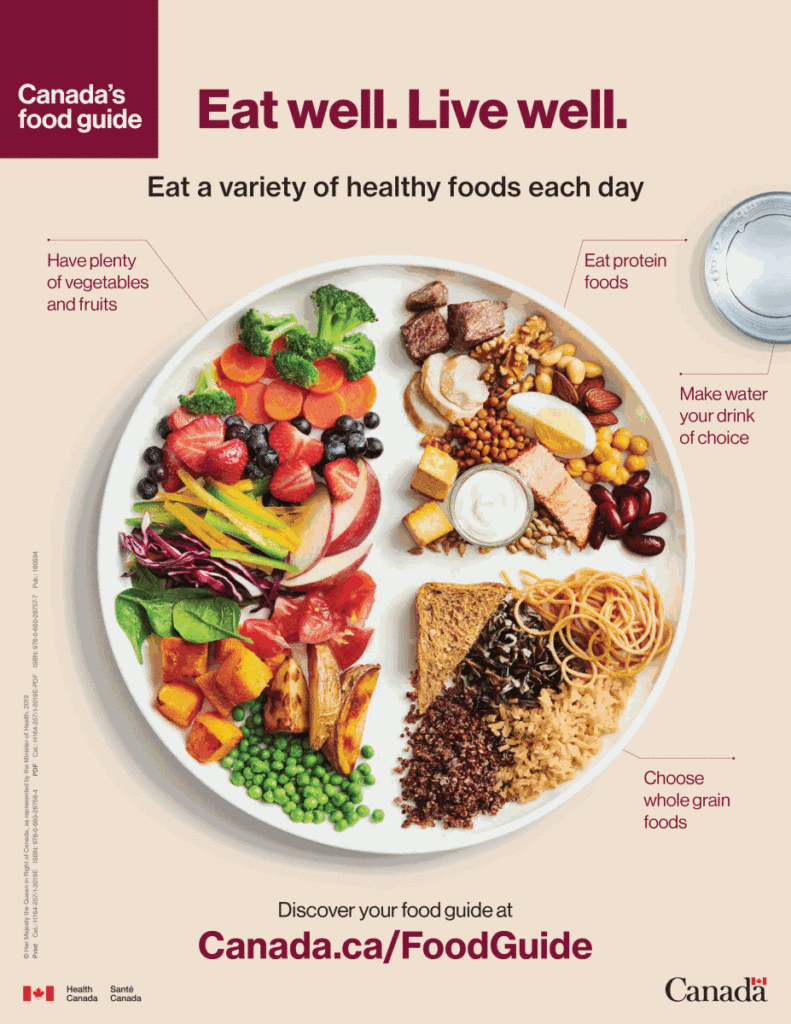Given the current global health crisis, it’s not surprising that people are looking for ways to build a healthy immune system!
Our immune systems are complex networks of pathways that help to protect our bodies against harmful bacteria and disease-causing substances. Many different factors affect the immune system’s ability to function. While we can’t control all of these things – like growing older – we can take steps to improve the lifestyle and eating habits that impact our immune health.
Here are 3 tips for a healthy immune system:
1. Eat a balanced diet
Just like the other cells in our body, our immune cells rely on nutrients to live and function properly. Diets that are low in fruits and vegetables and high in refined sugar or ultra-processed foods are likely missing key nutrients that support a healthy immune system. A balanced diet can give us all the protein, healthy fats, vitamins and minerals that we need.
To build a balanced meal:
- Fill half your plate with vegetables and fruit. The more variety and colors the better! Red, orange and dark green produce – like peppers, sweet potato or broccoli – are great sources of vitamin A and C.
- Fill a quarter of your plate with whole grains. These could include brown bread, rice or pasta, oatmeal, quinoa, or barley. Whole grains have lots of vitamin B6, iron and selenium.
- Fill the last quarter of your plate with protein foods. These will give you many essential nutrients, like iron, copper, calcium, zinc, vitamin B6, B12, D, and E. Protein foods can include anything from poultry, lean red meat and fish, to dairy, eggs, tofu and other soy products.

For more on balanced plates and general healthy eating, the NEW Canada’s Food Guide is a great resource.
2. Get your nutrients from food first
Many people take supplements because it’s an easy way to make sure all their nutritional needs are met – right? However, no pill or capsule will ever offer exactly the same benefit as the whole food. Additionally, supplements make it easy to take in more than you really need! A balanced diet can provide all the nutrients you need for a healthy immune system and overall wellbeing.
When might a supplement be beneficial?
With that being said, supplements can be helpful for some people, such as those who can’t afford or access healthy foods or those with higher nutrient needs. This could include – but is not limited to – low-income households, pregnant or lactating women, the elderly and critically ill individuals. If you have concerns, a doctor or dietitian can help determine if a supplement might be beneficial for you.
Vitamin D supplementation
If you’ve been watching the news lately, you may have heard the buzz about vitamin D and our immune systems. Some scientific studies suggest that having low levels of vitamin D could be associated with an impaired immune system. However, there’s not enough proof that taking supplements beyond your needs will give you any extra benefit against illness.
On the other hand, getting enough vitamin D can sometimes be a challenge, especially during the Canadian winter months. While the sun plays an important role in forming vitamin D in our skin, our shorter, colder days often mean we spend more time indoors. Further, vitamin D is only found in a relatively small number of foods. For example, oily fish (like salmon), red meat, liver, egg yolks and foods with added vitamin D, like milk. Therefore, some of us may not get enough vitamin D from food or sunshine alone, particularly during the winter. Currently, Health Canada recommends daily supplements to those 50 years and older.
Supplements & COVID-19
Please also be aware of health products that claim to prevent, treat or cure COVID-19. According to the NIH, there is no scientific support for any supplement or product claiming to prevent or treat coronavirus.
3. Incorporate healthy habits
Besides a balanced diet, there are other habits we can add into our lives to build healthy immune systems.
Get enough sleep
Not only is a good night’s rest key for overall health, but studies suggest that sleep can strongly regulate our body’s immune response. If you have trouble meeting 7-9 hours per night, you can take some steps to improve your “sleep hygiene“. Sticking to a regular sleep schedule, avoiding large meals or caffeine at night, and putting electronics away at least 30 minutes before bed might improve your ability to fall and stay asleep.
Get active
Evidence shows that exercising regularly can improve our immune defenses – and it also helps us sleep better too! The current recommendation for adults is 150 minutes of moderate to vigorous physical activity per week. To slowly ease into regular exercise or to fit a busy schedule, break this into smaller, more frequent sessions! For example, two 15 minute walks can be just as effective as one 30 minute walk! Finding an activity you enjoy can also make it easier to reach your goals.
Manage your stress
Various studies have shown that long-term stress can negatively impact our immune system and that the key may not be severity of stress, but the duration. Therefore, it is critical to find ways to manage even the everyday stress that we all experience throughout life. Eating well, exercising, sleeping well, seeking support from others and taking time for your favourite activities are good ways to care of yourself and reduce overall stress levels.
Take home message
Although there are no specific foods or diets to protect ourselves from illnesses like COVID-19, we can make changes to our regular eating and lifestyle habits to optimize our immune function. Not only can these tips increase our defenses and help us avoid getting sick, but they can also help us live a healthier, happier life overall.
